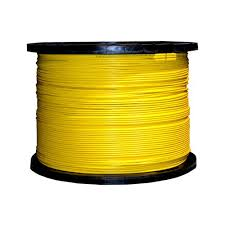-
أخر الأخبار
- استكشف
-
المدونات
-
المجموعات
Top Benefits of Fiber Optic Internet for Small Businesses

A dependable and fast internet connection is now essential for companies of all sizes in today's digitally first world. Every second matters to small businesses, and any delay can cost them money or the trust of their clients. Fiber optic internet can help with that.
This guide explores the top benefits of fiber optic internet for small businesses and helps you decide whether it’s the right investment for your operations.
What is Fiber Optic Internet?
Fiber optic internet uses cables made from thin strands of glass or plastic to transmit data using light. Unlike traditional DSL or cable connections that use copper wires, fiber optics offer much faster speeds, higher reliability, and lower latency.
Fiber internet is becoming increasingly available in urban and suburban areas and is a smart upgrade for small businesses seeking speed, efficiency, and long-term value.
1. Lightning-Fast Internet Speeds
One of the biggest advantages of fiber optic internet is its incredible speed.
-
Download and upload speeds can reach 1 Gbps or higher
-
Supports multiple devices without slowing down
-
Enables smoother video calls, file transfers, and real-time collaboration
Why it matters for small businesses:
Whether you're uploading large design files, using cloud software, or holding video meetings, speed keeps your business running without frustrating slowdowns.
2. Symmetrical Upload and Download Speeds
Fiber offers symmetrical speeds, in contrast to cable internet, which frequently offers fast downloads but slow uploads.
This means your upload speed is just as fast as your download speed. This is especially useful for:
-
Cloud-based file storage and backups
-
Video conferencing
-
Running remote desktop environments
-
Hosting webinars and virtual events
Why it matters:
Small businesses using cloud tools or remote teams benefit from faster uploads, making work more productive and communication smoother.
3. Improved Reliability
Fiber is more reliable than copper-based connections, especially during peak hours or bad weather. Why?
-
Resistant to electromagnetic interference
-
Not affected by temperature or moisture
-
Less signal degradation over distance
Why it matters:
Downtime can cost small businesses money, clients, and credibility. A fiber connection ensures fewer interruptions, keeping your business up and running.
4. Enhanced Cloud Access
More small businesses are adopting cloud services for everything from storage and accounting to CRM and project management.
Fiber internet supports:
-
Instant access to cloud platforms (e.g., Google Workspace, Microsoft 365, QuickBooks)
-
Fast syncing of files and backups
-
Smooth integration of tools across departments
Why it matters:
Whether working remotely or in the office, improved cloud access increases productivity and enables real-time team collaboration.
5. Scalability for Growth
As your business grows, your internet needs will grow too. Fiber optics can easily scale to meet future demands.
-
Upgrade bandwidth without replacing infrastructure
-
Support new technologies like VoIP, AI, or IoT
-
Handle more users and devices without a drop in performance
Why it matters:
You don’t want to reinvest in a new system every year. Fiber gives you room to grow without added hassle or cost.
6. Superior Video Conferencing and VoIP Calls
Clear, uninterrupted communication is essential for remote meetings and client calls. Fiber ensures:
-
High-definition video with minimal lag
-
Crystal-clear audio for VoIP or Zoom calls
-
Reduced dropped calls and frozen screens
Why it matters:
Video meetings have become the norm. Fiber gives your business a professional edge with smooth, dependable communication.
7. Increased Productivity
Every second your team waits for a web page to load or a file to upload is lost productivity.
Fiber eliminates common issues like:
-
Slow-loading apps
-
Interrupted cloud syncing
-
Lag during online training or customer support
Why it matters:
Fast internet helps your team get more done in less time, improving workflow and employee satisfaction.
8. Better Support for Multiple Devices
Today’s workplaces rely on multiple connected devices—computers, printers, phones, tablets, smart TVs, and more. Fiber can handle high traffic without slowing down.
Why it matters:
You won't experience lag, buffering, or connection drops even when several people are online or using bandwidth-heavy tools.
9. Enhanced Cybersecurity
While no connection is 100% secure, fiber offers added layers of safety:
-
Harder to tap into than copper cables
-
Lower risk of electromagnetic signal leakage
-
Compatible with advanced encryption methods
Why it matters:
Protecting sensitive customer or financial data is critical. Fiber supports secure communication and file transfers, helping you avoid data breaches or compliance issues.
10. Reduced Long-Term Costs
While fiber may have a higher initial installation cost, it often results in lower total costs over time:
-
Fewer outages mean less lost productivity
-
Better performance reduces need for IT support
-
Longevity reduces frequent replacement or upgrades
Why it matters:
Fiber is a long-term investment that can save small businesses money and stress in the long run.
11. Competitive Advantage
Small businesses need every edge they can get. Fiber internet gives you that edge by:
-
Allowing faster response to clients
-
Supporting modern tools and services
-
Creating smoother customer experiences online
Why it matters:
When your tech runs seamlessly, so does your business. Fast, stable internet can set you apart from competitors.
12. Supports Remote Work and Hybrid Teams
Fiber makes it easier to run your business from anywhere. Whether you’re managing a team, collaborating with freelancers, or working from home:
-
Remote access is quicker and smoother
-
Online tools work in real-time
-
Employees stay connected without lag or frustration
Why it matters:
Fiber ensures flexibility and business continuity, even when your team isn’t in the office.
Frequently Asked Questions (FAQs)
Q: Is fiber internet too expensive for small businesses?
Not always. Although the initial cost of installation may be higher, many providers provide reasonably priced monthly plans. The initial investment is frequently outweighed by the increased productivity and dependability.
Q: How is fiber different from cable internet?
Fiber uses light to transmit data, while cable uses electrical signals. Fiber is faster, more reliable, and less prone to interference.
Q: Do I need fiber if I only have a few employees?
Even small teams benefit from fiber, especially if you rely on cloud tools, remote work, or video conferencing.
Q: Is fiber available in my area?
Availability depends on your location. Check with local ISPs or bulk fiber optic cable service providers to see what’s offered in your area.
Conclusion: Is Fiber Optic Internet Right for Your Business?
Fiber optic internet is worth the investment if your small business relies on dependable, secure, and fast internet, as the majority do.
Fiber internet gives you the edge to compete in the rapidly evolving digital economy of today with faster speeds, better cloud access, improved communication, and expansion potential.







